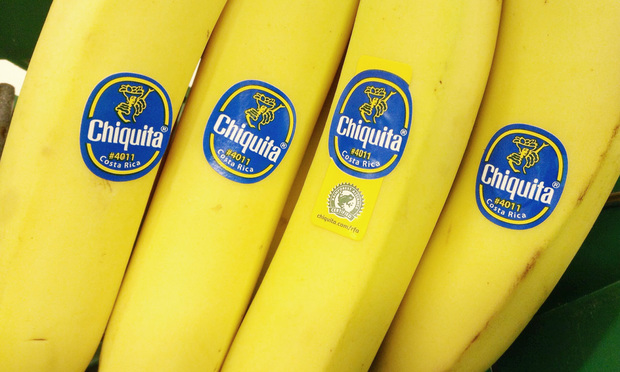 Chiquita bananas. Photo: Mike Mozart/Flickr.
Chiquita bananas. Photo: Mike Mozart/Flickr.
Families of six Americans killed by Colombian terrorists in the 1990s are set to ask a West Palm Beach jury next month to hold banana company Chiquita Brands International liable for financially supporting the guerrilla group responsible.
The case is moving toward a Feb. 5 trial after U.S. District Judge Kenneth Marra on Wednesday allowed the plaintiffs’ key claim — material support of a terrorist organization — to proceed past the summary judgment stage. The families allege a Chiquita subsidiary paid about $288,000 over nine years to the terrorist group Fuerzas Armadas Revolucionarias de Colombia, or FARC, in violation of the Anti-Terrorism Act.
 District Judge Kenneth A. Marra, Southern District of Florida
District Judge Kenneth A. Marra, Southern District of Florida
“Given the widely reported news relating to the decades-long civil war in Colombia, and emergence of notoriously violent guerrilla groups in the context of that war, a reasonable juror could conclude that giving money to Colombian guerrillas, having no function other than the perpetration of violence, would enhance the terror capabilities of the guerrillas and lead to more violence,” Marra ruled. ”While other factors undoubtedly contributed to the strife, none of these causes can be said to be unforeseeable as a matter of law.”
In the same order, Marra dismissed Chiquita’s “duress” defense claiming the alleged payments were made under threat of injury. He also tossed a secondary claim from the plaintiffs alleging Chiquita conspired with the FARC to murder Americans, finding no evidence of such an agreement.
“Our plaintiffs, especially the widows of the men who were kidnapped and killed by the FARC, are looking forward to finally having their day in court and seeing justice done,” said Miami attorney Ramon Rasco of Podhurst Orseck. Rasco represents the families of geologist Frank Pescatore and missionaries David Mankins, Mark Rich, Rich Tenenoff, Timothy Van Dyke and Stephen Welch.
The trial is scheduled to last six weeks. Rasco said the plaintiffs do not have a particular damages amount in mind, but he noted the Anti-Terrorism Act provides for treble damages.
The six slain men are some of the only U.S. citizens whose claims remain in the sprawling multidistrict litigation against Chiquita consolidated in the Southern District of Florida. Families of Colombian nationals also filed suit against the Switzerland-based company under the Alien Tort Statute, but those claims are in the discovery stage and are not likely to go to trial for at least a year.
Boies Schiller Flexner also represents three American family members of a Colombian national killed by a different guerrilla group, the Autodefensas Unidas de Colombia. The man’s brother was also tortured by the AUC. They claim violations of the Anti-Terrorism Act and the Torture Victim Protection Act.
Chiquita pleaded guilty in 2007 to funding the AUC and paid a $25 million fine.
The families of the Americans killed by the FARC filed their lawsuit in 2008, alleging Chiquita approved its former subsidiary Banadex’s decision to make 57 cash payments to FARC starting in 1989. The plaintiffs claim the multibillion-dollar corporation was focused on expanding banana operations in Colombia when it could have stopped operating in the war-torn country instead. Chiquita sold Banadex in 2004 and no longer owns any farms in Colombia.
Chiquita did not contact the U.S. or Colombian governments about FARC’s demands for money, according to Marra’s order.
The defense asked the judge to toss the families’ claims on summary judgment, arguing the complaint improperly alleged secondary liability for the murders. Chiquita also argued it did not have the knowledge of wrongdoing required to be held liable in the case and that the 10-year statute of limitations had tolled.
Marra agreed an Anti-Terrorism Act plaintiff must allege a defendant directly committed — not just facilitated — an act of international terrorism. But he ruled the plaintiffs’ improper legal logic did not prevent their claims from surviving summary judgment.
The facts as alleged support the idea that Chiquita knew its payments would be used to fund kidnappings and murders, ”and thus are sufficient to support the legal conclusion that Chiquita violated one of the material support statutes,” establishing primary liability, Marra ruled.
He also ruled jurors could disagree on the statute of limitations issue, finding ”Chiquita successfully kept this information [about payments] out of the public eye for nearly a decade, arguably depriving Plaintiffs of any meaningful opportunity to discover Chiquita’s relationship to the FARC.”
The judge also did not find evidence Chiquita met the requirements to use the “duress” affirmative defense, ruling ”Chiquita, by description of its own managers, was responding to a generalized fear of future retaliatory harm from the FARC, not imminent death or serious bodily injury to any employee or other person.”
The company also had “reasonable, legal alternatives” to expanding its fruit operations in Colombia, such as withdrawing and seeking government intervention, Marra ruled.
Chiquita attorney James Gavigan Jr. of Jones Foster Johnston & Stubbs in West Palm Beach did not respond to a request for comment by deadline. The company is also represented by Covington & Burling attorneys in New York and Washington.
Rasco and his colleague Bob Josefsberg represent the whole group of plaintiffs. Co-counsel for the five missionaries’ families are Kohn, Swift & Graf in Pennsylvania; Preti, Flaherty, Beliveau & Pachios in Maine; Von Briesen & Roper in Wisconsin; and the Osen firm in New Jersey. Pescatore’s family is also represented by Hagens Berman Sobol Shapiro attorneys in Washington state, New York and Massachusetts.
Marra is set to rule on a handful of evidentiary motions before trial starts.


